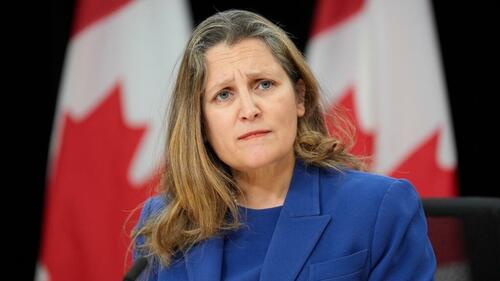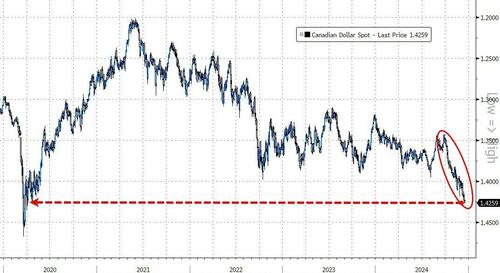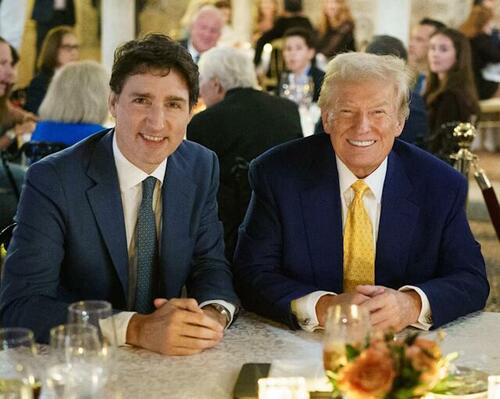Update (2:30pm ET): Canada's CTV News reports that Prime Minister Justin Trudeau is considering interrupting Parliament (prorogation) or resignation according to unnamed sources. The sources say he has spoken to his cabinet and plans to address Parliament later on Monday. This comes after finance minister Chrystia Freeland resigned earlier on Monday citing disagreements over how to deal with tariff threats from US president-elect Donald Trump.
If confirmed, it would mean government collapse in 4 of the staunchest, and most developed "non-banana republic" Western democracies: France, Germany, South Korea and now Canada. And, of course, we use the term "non-banana republic" sarcastically.
As for Turdeau, his odds of being Tru-done just spiked to 88% on Polymarket.
Odds Trudeau is out before April just hit 88%.
— Polymarket (@Polymarket) December 16, 2024
Trudone? pic.twitter.com/Fo6cWd00eU
* * *
In a stunning move that shakes the government, Canadian Finance Minister Chrystia Freeland has resigned from Prime Minister Justin Trudeau’s cabinet after he tried to move her to a different role.
Freeland has been the most powerful person in Trudeau’s cabinet for years, and was the point person in strategizing how to counter US President-elect Donald Trump’s threat to impose 25% tariffs.
Trudeau has now seen the departure of two finance ministers in a little more than four years.
Freeland got the job in 2020 after the prime minister had a falling out with then-Finance Minister Bill Morneau over issues such as spending on Covid-related income support programs.
Freeland released her statement in a post on X, pulling no punches (emphasis ours):
Dear Prime Minister,
It has been the honour of my life to serve in government, working for Canada and Canadians. We have accomplished a lot together.
On Friday, you told me you no longer want me to serve as your Finance Minister and offered me another position in the Cabinet.
Upon reflection, I have concluded that the only honest and viable path is for me to resign from the Cabinet.
To be effective, a Minister must speak on behalf of the Prime Minister and with his full confidence. In making your decision, you made clear that I no longer credibly enjoy that confidence and possess the authority that comes with it.
For the past number of weeks, you and I have found ourselves at odds about the best path forward for Canada.
Our country today faces a grave challenge. The incoming administration in the United States is pursuing a policy of aggressive economic nationalism, including a threat of 25 per cent tariffs.
We need to take that threat extremely seriously. That means keeping our fiscal powder dry today, so we have the reserves we may need for a coming tariff war. That means eschewing costly political gimmicks, which we can ill afford and which make Canadians doubt that we recognize the gravity of the moment.
That means pushing back against ‘America First’ economic nationalism with a determined effort to fight for capital and investment and the jobs they bring. That means working in good faith and humility with the Premiers of the provinces and territories of our great and diverse country, and building a true Team Canada response.
I know Canadians would recognize and respect such an approach. They know when we are working for them, and they equally know when we are focused on ourselves.
Inevitably, our time in government will come to an end. But how we deal with the threat our country currently faces will define us for a generation, and perhaps longer. Canada will win if we are strong, smart, and united.
It is this conviction which has driven my strenuous efforts this fall to manage our spending in ways that will give us the flexibility we will need to meet the serious challenges presented by the United States.
I will always be grateful for the chance to have served in government and I will always be proud of our government’s work for Canada and Canadians.
I look forward to continuing to work with my colleagues as a Liberal Member of Parliament, and I am committed to running again for my seat in Toronto in the next federal election.
Meanwhile, the Loonie has hit its weakest against the dollar since the COVID lockdown lows...
Freeland's resignation follows that of Housing Minister Sean Fraser over the weekend, who notably doesn’t plan to run in the next federal election.
Perhaps Freeland and Fraser see the painful writing on the wall for their boss...
As we highlighted in a recent post, Turdeau’s government (sic) would have no choice but to respond if Trump simply exempted energy while hitting all other Canadian products, said Bloomberg sources, adding that’s a scenario that could prompt the use of export taxes by Canada.
But for the prime minister, going down this path would cause serious political divisions within Canada. Oil, uranium and potash production are concentrated in the western provinces of Alberta and Saskatchewan.
Those provinces are the strongest voter base for Conservative Leader Pierre Poilievre, and their provincial governments are staunch right-wing opponents of Trudeau.
In short, while Turdeau may retaliate in a Trump trade war, such an action will likely be his last.
Update (2:30pm ET): Canada's CTV News reports that Prime Minister Justin Trudeau is considering interrupting Parliament (prorogation) or resignation according to unnamed sources. The sources say he has spoken to his cabinet and plans to address Parliament later on Monday. This comes after finance minister Chrystia Freeland resigned earlier on Monday citing disagreements over how to deal with tariff threats from US president-elect Donald Trump.
If confirmed, it would mean government collapse in 4 of the staunchest, and most developed "non-banana republic" Western democracies: France, Germany, South Korea and now Canada. And, of course, we use the term "non-banana republic" sarcastically.
As for Turdeau, his odds of being Tru-done just spiked to 88% on Polymarket.
Odds Trudeau is out before April just hit 88%.
— Polymarket (@Polymarket) December 16, 2024
Trudone? pic.twitter.com/Fo6cWd00eU
* * *
In a stunning move that shakes the government, Canadian Finance Minister Chrystia Freeland has resigned from Prime Minister Justin Trudeau’s cabinet after he tried to move her to a different role.
Freeland has been the most powerful person in Trudeau’s cabinet for years, and was the point person in strategizing how to counter US President-elect Donald Trump’s threat to impose 25% tariffs.
Trudeau has now seen the departure of two finance ministers in a little more than four years.
Freeland got the job in 2020 after the prime minister had a falling out with then-Finance Minister Bill Morneau over issues such as spending on Covid-related income support programs.
Freeland released her statement in a post on X, pulling no punches (emphasis ours):
Dear Prime Minister,
It has been the honour of my life to serve in government, working for Canada and Canadians. We have accomplished a lot together.
On Friday, you told me you no longer want me to serve as your Finance Minister and offered me another position in the Cabinet.
Upon reflection, I have concluded that the only honest and viable path is for me to resign from the Cabinet.
To be effective, a Minister must speak on behalf of the Prime Minister and with his full confidence. In making your decision, you made clear that I no longer credibly enjoy that confidence and possess the authority that comes with it.
For the past number of weeks, you and I have found ourselves at odds about the best path forward for Canada.
Our country today faces a grave challenge. The incoming administration in the United States is pursuing a policy of aggressive economic nationalism, including a threat of 25 per cent tariffs.
We need to take that threat extremely seriously. That means keeping our fiscal powder dry today, so we have the reserves we may need for a coming tariff war. That means eschewing costly political gimmicks, which we can ill afford and which make Canadians doubt that we recognize the gravity of the moment.
That means pushing back against ‘America First’ economic nationalism with a determined effort to fight for capital and investment and the jobs they bring. That means working in good faith and humility with the Premiers of the provinces and territories of our great and diverse country, and building a true Team Canada response.
I know Canadians would recognize and respect such an approach. They know when we are working for them, and they equally know when we are focused on ourselves.
Inevitably, our time in government will come to an end. But how we deal with the threat our country currently faces will define us for a generation, and perhaps longer. Canada will win if we are strong, smart, and united.
It is this conviction which has driven my strenuous efforts this fall to manage our spending in ways that will give us the flexibility we will need to meet the serious challenges presented by the United States.
I will always be grateful for the chance to have served in government and I will always be proud of our government’s work for Canada and Canadians.
I look forward to continuing to work with my colleagues as a Liberal Member of Parliament, and I am committed to running again for my seat in Toronto in the next federal election.
Meanwhile, the Loonie has hit its weakest against the dollar since the COVID lockdown lows...
Freeland's resignation follows that of Housing Minister Sean Fraser over the weekend, who notably doesn’t plan to run in the next federal election.
Perhaps Freeland and Fraser see the painful writing on the wall for their boss...
As we highlighted in a recent post, Turdeau’s government (sic) would have no choice but to respond if Trump simply exempted energy while hitting all other Canadian products, said Bloomberg sources, adding that’s a scenario that could prompt the use of export taxes by Canada.
But for the prime minister, going down this path would cause serious political divisions within Canada. Oil, uranium and potash production are concentrated in the western provinces of Alberta and Saskatchewan.
Those provinces are the strongest voter base for Conservative Leader Pierre Poilievre, and their provincial governments are staunch right-wing opponents of Trudeau.
In short, while Turdeau may retaliate in a Trump trade war, such an action will likely be his last.




